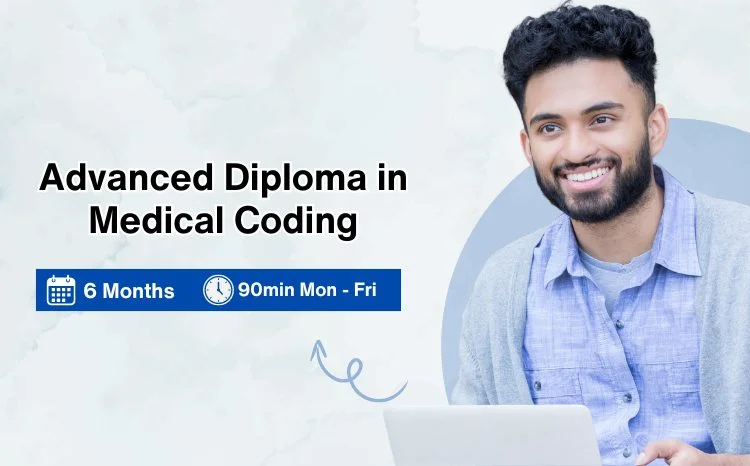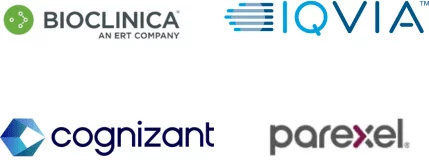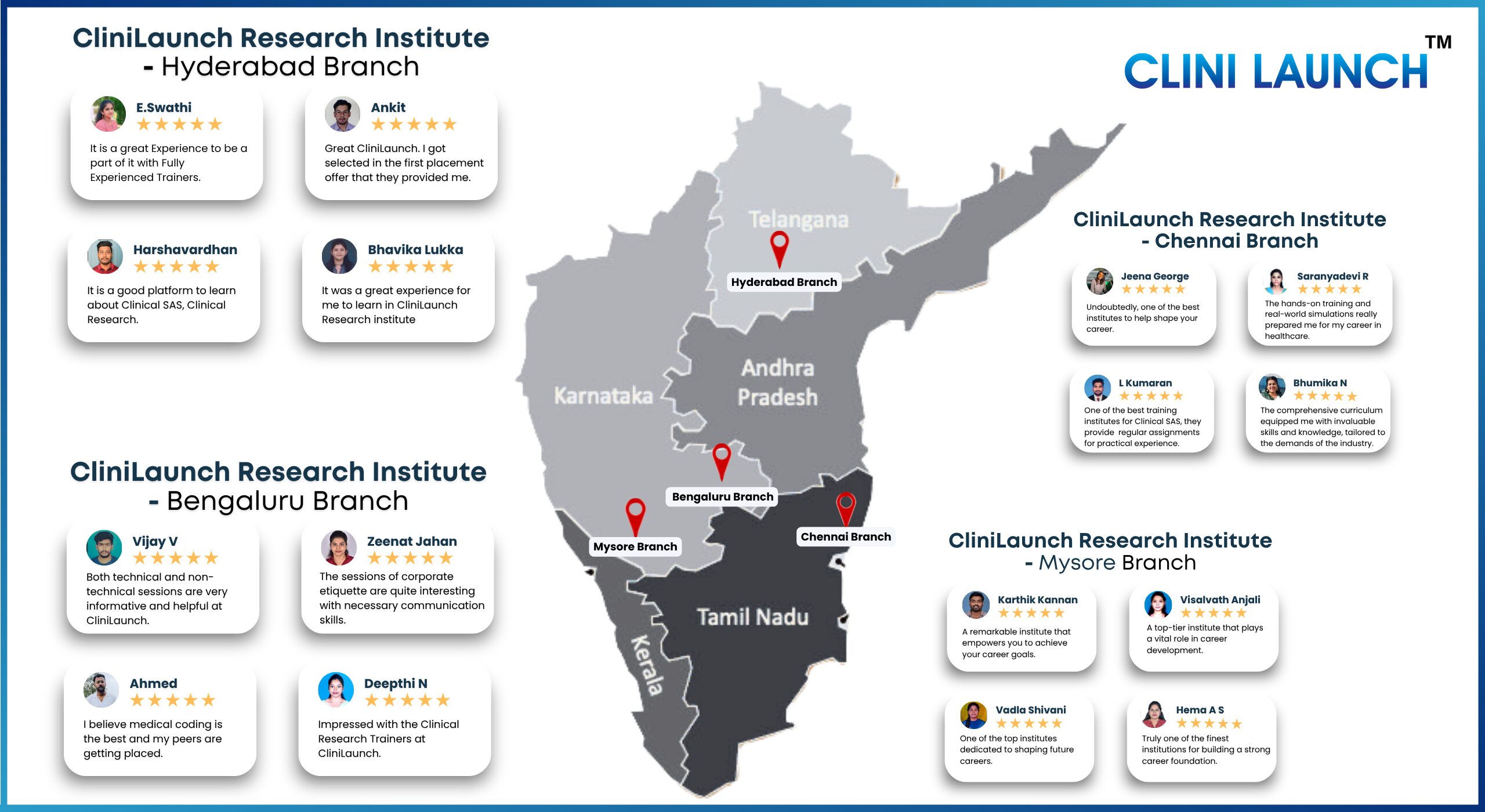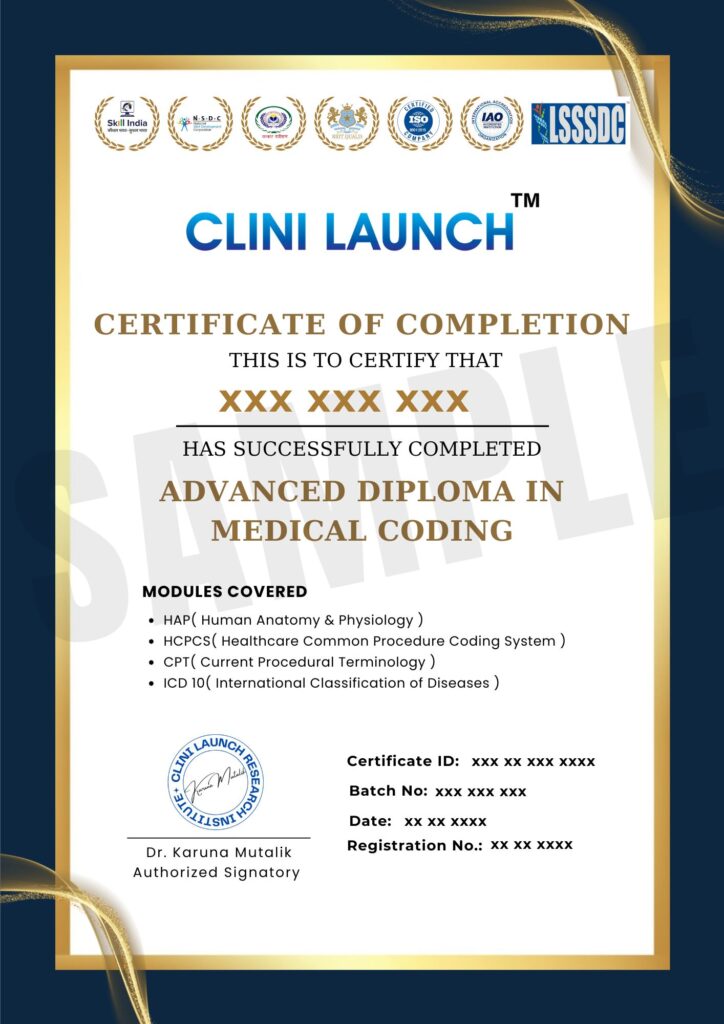Medical Coding Course
- 100% Placement Assistance
- Comprehensive Curriculum
- Hand-on Practical Training
- Online or Offline Sessions
This medical coding course typically helps you get ready for industry certifications like Certified Professional Coder (CPC) exam, opening doors to vital roles in healthcare administration.
In Collaboration With :

Live Online Classes starting on 8th, 15th, 22nd & 30th.
Book Your Free Demo Class Today!

IAO & NSDC Accredited Courses

IAO & NSDC Accredited Courses

IAO & NSDC Accredited Courses

IAO & NSDC Accredited Courses
Why is a medical coding course important?
A medical coding course is crucial because it trains individuals to translate complex healthcare services into standardized reimbursement for healthcare providers and maintaining their financial stability. This specialized skill facilitates efficient revenue cycle management and compliance with healthcare regulations and contributes to precise public health data collection and research.
Globally Accredited Courses
100% Placement Assistance
Highly Qualified Trainers
Job Oriented Programs
Our Courses

Certification in Medical Coding
Be prepared to become a Certified Medical Coder. Learn how to use coding manuals by understanding anatomy, medical terminology, and physiology.

Advanced Diploma in Medical Coding
Learn to transform your vital healthcare data into documents including diagnosis, procedures, services & equipment into universal alphanumeric codes.
Career Paths after Medical Coding Course
Medical Coder
Medical coding involves a health information professional who translates patient information into medical codes. They use codes that are used for billing and record-keeping by healthcare providers and insurance companies.
Certified Professional Coder
A Certified Professional Coder (CPC) is a healthcare professional who has passed a certification exam that shows their skills with medical coding training demonstrating their knowledge in CPC Exam.
Coding Specialist
Coding specialist is a healthcare professional who converts patient information into universal medical codes. They specifically work in hospitals, clinics, and doctors’ office to ensure the healthcare providers receives reimbursement for their services.
Clinical Informatics
Clinical Informatics is the use of information technology in healthcare to improve patient care. It involves analysis, design and evaluation of information system to improve patient outcomes, increase access to care, advance medical research, and strengthen the clinician-patient relationship.
Billing Analyst
A billing analyst works in a company’s accounting department to ensure that clients are billed correctly. With the billing and coding online, healthcare professionals manage accounts receivables, issue invoices, and oversee revenue intake.
Medical Records Clerk
A medical records clerk manages patient health records in a healthcare facility, such as a hospital or clinic. They are also known as health information check.
Career Paths after Medical Coding Course
Medical Coder
Medical coding involves a health information professional who translates patient information into medical codes. They use codes that are used for billing and record-keeping by healthcare providers and insurance companies.
Certified Professional Coder
A Certified Professional Coder (CPC) is a healthcare professional who has passed a certification exam that shows their skills with medical coding training demonstrating their knowledge in CPC Exam.
Coding Specialist
Coding specialist is a healthcare professional who converts patient information into universal medical codes. They specifically work in hospitals, clinics, and doctors’ office to ensure the healthcare providers receives reimbursement for their services.
Clinical Informatics
Clinical Informatics is the use of information technology in healthcare to improve patient care. It involves analysis, design and evaluation of information system to improve patient outcomes, increase access to care, advance medical research, and strengthen the clinician-patient relationship.
Billing Analyst
A billing analyst works in a company’s accounting department to ensure that clients are billed correctly. With the billing and coding online, healthcare professionals manage accounts receivables, issue invoices, and oversee revenue intake.
Medical Records Clerk
A medical records clerk manages patient health records in a healthcare facility, such as a hospital or clinic. They are also known as health information check.
What Sets CliniLaunch Apart

Placement Assistance
Strong network of recruiters from the healthcare, pharmaceutical, and biotechnology industries and offer placement assistance to students.
Industry Expert Trainers
Equip yourself with skills and knowledge under the mentorship of experienced faculties with over 17 years of experience in the field of healthcare research and training.
Learning Management System
Embark on a transformative learning experience with our state-of-the-art Learning Management System!
Non-Technical and Technical Sessions
Go beyond the textbook with a well-rounded foundation balancing essential technical and non-technical skills needed to thrive in healthcare, IT and Pharma.
Job Oriented Programs
Get comprehensive job-oriented programs to empower you with the skills and knowledge you need to succeed in the dynamic and competitive healthcare sector.
Eligibility Criteria for Medical Coding Course
To qualify for a medical coding course, you’ll generally need a high school diploma or equivalent. While not always mandatory, a background in life sciences or healthcare (like nursing or pharmacy) is highly beneficial, as is a solid understanding of anatomy, physiology, and medical terminology. You’ll also need good computer skills and a strong attention to detail.
Designations :


Want to attend the best medical coding program online?
Medical Coding Course in Online Curriculum Designed by Experts
Medical Coding Course
Introduction to Medical Coding
This module provides a foundational understanding of what medical coding is, it’s crucial role in the healthcare revenue cycle, and its significance for accurate billing, insurance claims, and health data analysis. It covers the history of coding, an overview of the different coding systems, and the ethical and legal aspects of medical coding, including compliance regulations like HIPAA.
Authorities and Certification Exams
Medical Terminology
Essential for understanding medical records, this module teaches the language of medicine. Students learn to decipher medical terms by breaking them down into prefixes, suffixes, root words, and combining forms, focusing on terms related to various body systems, diseases, procedures, and medications. This foundational knowledge is critical for accurately abstracting information from clinical documentation.
Medical Anatomy and Physiology (System-Wise Review)
This module provides a comprehensive review of the human body’s structure (anatomy) and how its systems function (physiology). It typically covers each body system (e.g., circulatory, respiratory, digestive, musculoskeletal, nervous) in detail, along with common diseases and conditions associated with them. A strong understanding of A&P is vital for coders to accurately assign codes based on the patient’s condition and the services rendered.
Medical Writing
While not universally a core module in all medical coding courses, some comprehensive programs may include a “Medical Writing” component. If present, it would focus on developing skills in clear, concise, and accurate documentation within a healthcare context. This might include understanding how to interpret and abstract information from medical records, the importance of detailed clinical notes for accurate coding, and potentially a brief overview of different types of medical documents. Note: A full “Medical Writing” course is a specialized field distinct from medical coding, often for those who write research papers, regulatory documents, etc.
ICD-10-CM Coding Guidelines and Code Sets
This module is dedicated to the International Classification of Diseases, 10th Revision, Clinical Modification (ICD-10-CM), which is used for coding diagnoses and inpatient procedures. Students learn the official guidelines for code assignment, including conventions, instructional notes, and chapter-specific rules, enabling them to select the most specific and accurate diagnosis codes from medical documentation.
CPT Coding
This module focuses on the Current Procedural Terminology (CPT) code set, used for reporting medical procedures and services performed by physicians and other healthcare providers. Students delve into the structure of the CPT manual, understanding the different sections (e.g., Evaluation and Management, Surgery, Radiology, Pathology and Laboratory, Medicine), and learning how to accurately assign codes based on the services documented.
Use of Modifiers
Modifiers are crucial for two-digit codes appended to CPT or HCPCS codes to provide additional information about a service or procedure, altering its meaning without changing the definition of the main code. This module teaches the appropriate application of various modifiers to reflect specific circumstances, such as multiple procedures, professional components, or unusual circumstances, ensuring correct reimbursement and compliance.
Errors in Medical Coding
This module highlights common mistakes and pitfalls in medical coding that can lead to claim denials, underpayment, overpayment, or even legal issues. It covers topics like unbundling, upcoding, downcoding, insufficient documentation, incorrect modifier usage, and failure to stay updated with coding guidelines. The emphasis is on identifying, preventing, and correcting these errors to ensure compliance and optimize the revenue cycle.
FREE Career Counselling
We are happy to help you 24/7
A Student’s Journey



Industry-Ready Training
Equip yourself with skills and knowledge required to be successful in the healthcare-pharma or healthcare-IT industry. Enhance your communication and personality.
Certified Courses
Earn credentials through online or in-person programs validating the enhancement of your skills and expertise in the healthcare IT and pharma sectors.
Get Placed
Gain access to volunteer, internship, and placement opportunities and apply real-world applications in healthcare settings like hospitals, CROs, and pharma companies.
Level up your Career with a Medical Coding Course in Online Classes. Real people. Real results.
Master in-demand skills and knowledge
Propel your clinical research career with CliniLaunch

Unlock your potential Mentorship advantage
Personalized industry experts with career advice and support for your choices.

Navigate your medical career with confidence
Unlock your potential with upskilling in what you truly enjoy

Why Clini Launch?
Industry Driven Curriculum
- Adapt to industry standards
- Gain in-depth knowledge
- Up to date your skill sets
Experienced Instructors
- Interact with seasoned professionals
- Insightful healthcare practices
- Dedicated industry experts
Hands-on Learning
- Live interactive session
- Integrated case studies
- Practical step guidance
Industry Recognized Accreditations
- International Accreditation Forum (IAF)
- National Skill Development Council (NSDC)
Career Support Services
- Access to Career support group
- Resume Building Workshops
- Placement Mentorship Program
FAQ's on Medical Coding Courses
Medical Coding Course
The primary objective of a Medical Coding Course is to train individuals to translate complex healthcare diagnoses, procedures, services, and equipment into standardized alphanumeric codes. This conversion is crucial for accurate medical billing, efficient insurance claim processing, data analysis for public health, and maintaining comprehensive patient records in the healthcare industry.
While not always a strict prerequisite, foundational knowledge in human anatomy, physiology, and medical terminology is essential. A good Medical Coding Course will either integrate these subjects into its curriculum or assume a basic understanding, as accurate coding heavily relies on interpreting clinical documentation written in medical language.
A comprehensive Medical Coding Course specifically prepares individuals for professional certification exams (like the CPC from AAPC or CCS from AHIMA) by structuring its curriculum around the exam syllabi. This includes in-depth coverage of coding guidelines (ICD-10-CM, CPT, HCPCS Level II), extensive practice with coding scenarios, mock exams, and often review sessions led by certified instructors.
The typical duration for a Medical Coding Course in Bangalore is usually around 3 to 6 months for most diploma or certificate programs. Fees can vary significantly based on the institute’s reputation, curriculum depth, and placement assistance, generally ranging from INR 30,000 to INR 1,00,000. Some premium programs with extensive placement support might be higher.
Bangalore, being a major hub for healthcare BPOs, IT companies with healthcare divisions, and large multi-specialty hospitals, offers several advantages for a Medical Coding Course. These include:
- Higher job opportunities in the local market.
- Access to industry experts as trainers.
- Strong networking possibilities with professionals in the field.
- A competitive learning environment with a variety of institutions.
Many medical coding institutes in Bangalore offer dedicated placement assistance, given the high demand for skilled coders. This typically includes:
- Resume building and interview preparation workshops.
- Mock interviews.
- Direct job referrals to their network of hiring companies (CROs, healthcare BPOs, pharma companies).
- Some institutes even claim 100% placement support or guaranteed interviews.
The primary benefits of pursuing a Medical Coding Course online include immense flexibility and cost-effectiveness. Online courses allow students to:
- Learn at their own pace from anywhere, making it ideal for working professionals or those with family commitments.
- Save on commuting and accommodation costs.
- Access to a wider range of courses from national and international providers.
- Often gain lifetime access to course materials and recorded sessions.
Medical coding courses in online format ensure practical application through various methods:
- Interactive exercises and coding scenarios using simulated medical records.
- Access to virtual coding platforms or software demos.
- Practice exams that mimic the format and content of professional certification tests.
- Live online sessions with instructors for doubt clarification and real-time coding discussions.
- Some may integrate virtual internships or capstone projects.
To ensure the quality and recognition of an online Medical Coding Course, consider:
- Accreditation and affiliation: Look for courses from reputable institutions or those recognized by bodies like AAPC or AHIMA.
- Instructor credentials: Ensure trainers are experienced and certified medical coders.
- Comprehensive curriculum: Verify that it covers all major coding systems (ICD-10-CM, CPT, HCPCS) and prepares for specific certifications.
- Alumni reviews and success stories: Check for positive feedback regarding job placements and career progression.
- Technical support and learning platform quality.
The general profile of students pursuing a Medical Coding Course in Chennai often includes graduates from life sciences, pharmacy, nursing, or medical fields. Additionally, professionals looking for a career change or those seeking to enhance their existing healthcare administrative skills also frequently enroll, leveraging Chennai’s significant healthcare and IT-BPO sector.
Medical Coding Courses in Chennai often cater to both freshers and experienced professionals by offering:
- Foundation modules in anatomy, physiology, and medical terminology for those new to healthcare.
- Advanced coding scenarios and specialized training for experienced individuals looking to enhance their skills or gain specific certifications.
- Flexible batch timings (weekdays, weekends, online) to accommodate different schedules.
- Tailored placement assistance based on experience levels.
Yes, after completing a general Medical Coding Course in Chennai, there are ample opportunities for specialization. Many institutes and employers encourage or support further certifications in areas such as:
- Inpatient Coding (e.g., CIC for hospitals)
- Outpatient Coding (e.g., COC for physician offices)
- Risk Adjustment Coding (CRC)
- Auditing (e.g., CPMA)
- Specific specialties like Surgery, Radiology, or Evaluation & Management (E/M) coding can lead to higher earning potential.
Continuous learning and updates are crucial in the field of Medical Coding because coding guidelines and regulations are frequently updated by regulatory bodies (e.g., CMS, NCCI) and code set developers (e.g., AMA for CPT, WHO for ICD). Coders must stay current to ensure accurate claims, avoid denials, maintain compliance, and adapt to changes in healthcare technology and service delivery.
Auditing in Medical Coding involves reviewing coded medical documentation to ensure accuracy, compliance with coding guidelines, and adherence to payer policies and regulatory requirements (like HIPAA). It plays a critical role in preventing fraud, waste, and abuse, identifying coding errors, and ensuring appropriate reimbursement for healthcare services.
The transition from ICD-9 to ICD-10 significantly impacted the role of a medical coder by introducing a much more detailed and specific coding system. This required coders to:
- Expand their anatomical and physiological knowledge.
- Understand highly granular diagnostic codes.
- Adapt to new documentation requirements.
- Ultimately, this transition underscored the need for higher precision and continuous professional development in medical coding.
Clini Launch recently placed students




















Testimonials
Upskilling does make a difference. Graduates speak out. Hear what our students and professionals are saying about their upskilling journey with Clini Launch.
Posted on

